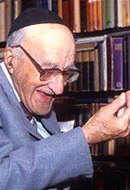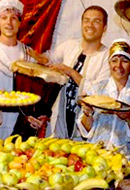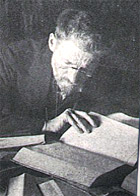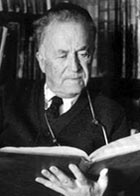Hebrew Literature
 Leibowitz at 110
Leibowitz at 110Monday, February 11, 2013 by Jeffrey Saks | Jewish Ideas Daily » Daily Features
A scientist, a philosopher, and a sharp-tongued public intellectual, Yeshayahu Leibowitz was an oracle for some, a crank to others. Two decades since his death, his ideas remain influential on Israeli society.
 Buczacz by Way of Newark: On Literary Lives at the End
Buczacz by Way of Newark: On Literary Lives at the EndThursday, January 10, 2013 by Jeffrey Saks | Jewish Ideas Daily » Daily Features
Philip Roth has bowed out gracefully from the literary world. But for the great Hebrew writer S. Y. Agnon, retirement was never an option.
 The Loyalties of the Sephardim
The Loyalties of the SephardimFriday, July 22, 2011 by Aryeh Tepper | Jewish Ideas Daily » Daily Features
In a recent Haaretz column, Gideon Levy, the radical leftist polemicist, sounded the warning that Israel's religious Zionists—"the knitted skullcaps"—have joined hands with the ultra-Orthodox and the Sephardim to form "a united tribe of zealots."
 The Bible and the Good Life
The Bible and the Good LifeThursday, July 14, 2011 by Aryeh Tepper | Jewish Ideas Daily » Daily Features
What manner of work is the Hebrew Bible? The 17th-century freethinker Baruch (Benedict) Spinoza had an answer. As part of his war to emancipate philosophy from the influence of religion, he reduced the biblical message to, in effect, one word: obedience.
 Mimouna!
Mimouna!Friday, May 13, 2011 by Aryeh Tepper | Jewish Ideas Daily » Daily Features
What did two million Israelis do when Passover ended this year? As in previous years, they celebrated Mimouna, a Moroccan Jewish holiday that is popularly observed by picnicking, barbecueing, and consuming moufletas (sweet North African pancakes). And what is Mimouna all about? No one really knows.
 Speaking of Hebrew
Speaking of HebrewMonday, April 26, 2010 | Jewish Ideas Daily » Daily Features
Over time, successful social transformations lose their capacity to amaze. So it is that we forget just how astounding was the modern revival of Hebrew as a language suitable for all aspects of life. Of course, Hebrew never really died; throughout history it was the written language of scholarship and religious thought, and the spoken and sung language of prayer. This rich and multi-layered legacy was mined by the Zionist writers, linguists, and educators who over decades would painstakingly bring forth the modern Hebrew language. Among the questions they had to settle was how, exactly, to pronounce it. The decision was to...
 Agnon
AgnonThursday, February 25, 2010 | Jewish Ideas Daily » Daily Features
In 1966 a diminutive man, a large black kippah perched on his head, was awarded the Nobel Prize for literature. His acceptance speech, delivered in the lilting cadences of his native Galicia, brimmed with allusions to holy texts, conjuring up an evanescent aura of piety and sacred longings. Yet underneath that kippah, and vibrating in the spaces between the ancient Hebrew words, was one of the most cunning minds and radical pens in Jewish literary history. Born Shmuel Yosef Czazkes in the town of Buczcacz, S. Y. Agnon, who died 40 years ago today at the age of eighty-one, moved to...
Editors' Picks
The Storyteller’s Gift Robert Pinsky, New York Times. Retrospective, the new novel by Israeli writer A.B. Yehoshua, “undertakes to conjure nothing less than the enigmatic, irresistible majesty of the past that governs human action.”
O Pioneers! Hillel Halkin, Jewish Review of Books. They graduated from American colleges, read American literature, and traveled in America. So, why did these immigrant poets insist on writing in the little-read language of Hebrew?
The Maturation of Etgar Keret Bezalel Stern, The Millions. While other Israeli authors write about the country's political or social problems, Etgar Keret focuses on the futility of the human condition. Israel just brings that condition into stark relief.
Ways and Means Joseph Lowin, Hadassah. The root alef, resh, het, meaning to travel, is used in two important narratives in Genesis and still is encountered in modern Hebrew. Just don't try to give an orhit to an airport customs agent.
Sound Tracks Haim O. Rechnitzer, H-Net. The so-called authentic Hebrew pronunciation that prevailed in Israel's schools was simply a version of the Ashkenazic speakers' attempt to sound more Sephardic.
Israel's Pulp Fiction Evan Lewis, Arizona State University News. Countercultural publishing thrived in Israel's first decades, with Westerns, espionage thrillers, science fiction, and what might be seen as the country's first literary responses to the Holocaust.
Monsters into Songbirds James Warner, Open Democracy. Israeli author Etgar Keret's cryptic popular fantasies can be read as coping strategies for a morally ambiguous world.
A Living, Humming Instrument Allan Nadler, Forward.
The great poet of cultural Zionism, Hayim Nahman Bialik (1873–1934), also gave voice to the predicament of loving religious Judaism while violating its norms.
Coming of Age Adam Kirsch, Tablet. The prolific Hebrew poet Leah Goldberg, born a century ago, was also the author of a piercing novel of adolescence and romance, now released in English.
Strings Attached Paul Berger, Forward. Money alone has not sufficed to buy a treasured Judaica library containing, among other unique specimens, hundreds of handwritten Hebrew documents dating back as much as 1,000 years.

